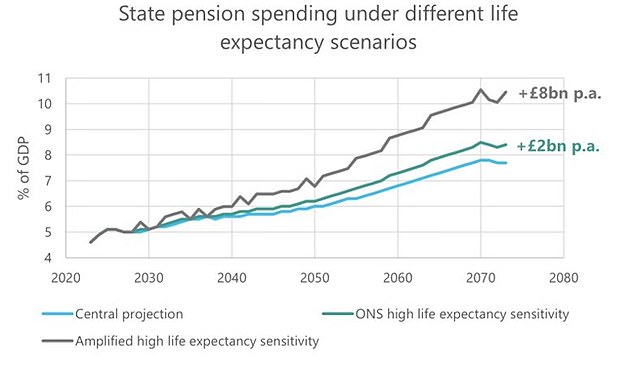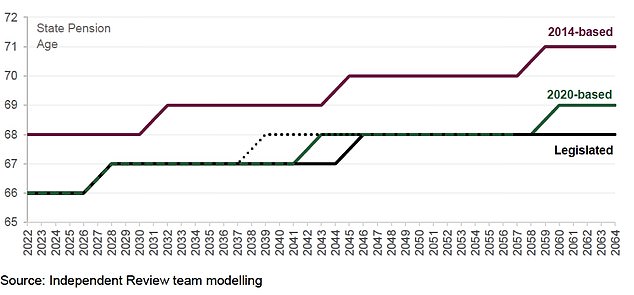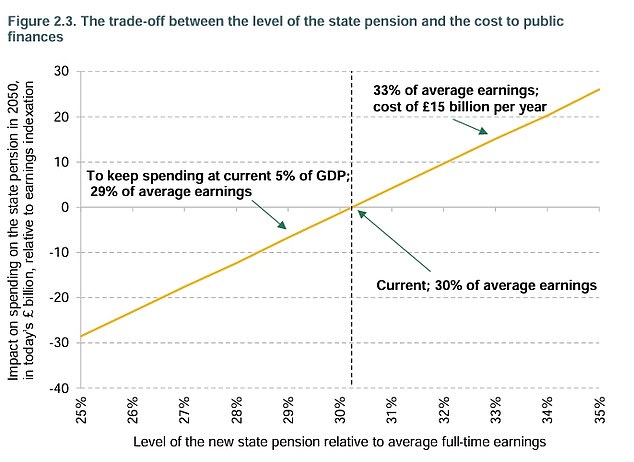Brits are facing a stark warning today that the state pension crisis could be even worse than feared.
Concerns have been raised that estimates by the Treasury’s OBR watchdog might be underplaying the challenges posed by life expectancy improvements.
According to analysis by consultancy Barnett Waddingham, a more ‘cautious’ approach would be to assume the longevity gap closes between the poorer and wealthier ends of society.
That suggests spending would be the equivalent of £8billion a year higher by the mid-2070s.
Maintaining the cost of the state pension at around the current proportion of GDP would then require withholding the payments until people reach 80, rather than 74 as previously mooted.
The grim calculations emerged as a union threatened to take to the streets if the government tries to increase the official retirement age more quickly.
The Rail, Maritime and Transport union lashed out after a government review was launched this week – although it is not expected to report until the end of the decade.
Speculation is mounting about the sustainability of the pensions triple lock, which means the state’s old-age payouts rise by whichever is highest out of rates of inflation, earnings or 2.5 per cent every year.

Concerns have been raised that estimates by the Treasury’s OBR watchdog might be underplaying the challenges posed by life expectancy improvements

Dr Suzy Morrissey has been commissioned by Work and Pensions Secretary Liz Kendall (pictured) to look at the ‘factors government should consider’ on state pension age

A government review published in 2023 indicated that if life expectancy returned to the trajectory expected in 2014 the state pension age could be 71 by the late 2050s
The OBR warned earlier this month that the policy could cost three times as much as originally expected by the end of the decade, as the ageing population piles further pressure on public finances.
The pension age is already slated to rise to 67 between 2026 and 2028.
Currently the legal position is that it will reach 68 from 2044-46.
But a previous report by former Tesco director Baroness Neville-Rolfe cautioned that might need to be accelerated.
With the triple lock in place it has been estimated the level would have to hit 74 by 2065–67 in order to keep spending at around 6 per cent of GDP.
But Jack Carmichael, senior consulting actuary at Barnett Waddingham, said there was a ‘very real risk’ that the situation would be even worse.
‘The OBR’s ‘Fiscal risks and sustainability’ report shows the cost of State Pension as a proportion of GDP doubling over the next 50 years, driven by a growing retirement population relative to the working age population,’ he said.
‘The OBR’s modelling uses a high life expectancy scenario, based on the ONS’s definition in their population projections, that results in an additional annual State Pension cost of c£2billion in today’s terms.
‘It assumes a long-term rate of 1.9 per cent, rather than 1.2 per cent.
‘In reality, that sensitivity is too cautious and broad-brush, which underplays the degree of longevity risk in the State Pension system.
Mr Carmichael suggested it would be more appropriate to assume ‘a closing of the life expectancy gap between the individuals with the lowest and highest life expectancy’.
‘Not only does this more accurately capture the financial impact of longevity risk in the UK State Pension system, it is also more likely to reflect healthcare spending priorities over the next 50 years if those living the longest at the moment are assumed to have almost reached the life expectancy cap,’ he said.
‘Under this alternative life expectancy sensitivity, the annual cost of the State Pension would increase by c£8billion – four times higher than the current model predicts.
‘To keep the cost of the State Pension at a similar proportion of GDP would then require a massive increase in the State Pension Age, potentially up to the dizzying heights of age 80.’
Dr Suzy Morrissey has been commissioned by Work and Pensions Secretary Liz Kendall to look at the ‘factors government should consider’ on state pension age.
And the Government Actuary’s Department has been asked to produce a report on the proportion of adult life in retirement.
However, it is understood that final decisions are highly unlikely to be taken until the next Parliament, despite concerns about giving people enough time to prepare for changes.
RMT general secretary Eddie Dempsey said: ‘The UK state pension is already one of the worst in the entire developed world, which is a direct result of decades of governments transferring both our national and personal wealth to the super rich.

The IFS highlighted that maintaining the state pension at current levels relative to earnings would mean increasing the proportion of GDP spent on it
‘Any decision to squeeze more out of working people by forcing us to work even longer would be a national disgrace.’
He continued: ‘Our members work in physically demanding, round-the-clock, safety-critical jobs.
‘Many already struggle to reach retirement in good health, especially shift workers.
‘Raising the pension age even further isn’t just cruel and unnecessary, it’s a slap in the face to the very people who keep this country running.
‘If this government makes any move to drastically increase the retirement age, we intend to lead our movement onto the streets and will not hesitate to protest nationally and take co-ordinated direct action.’










